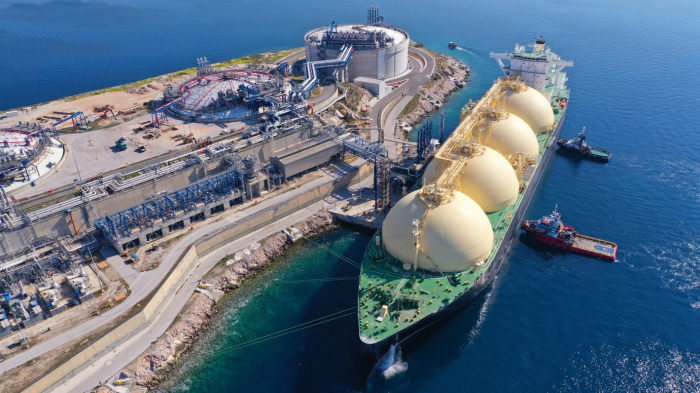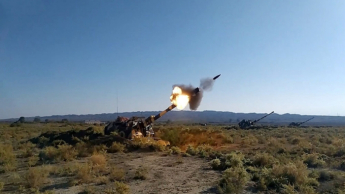What are the consequences of sanctions on Russian LNG for Europe and Russia? - ANALYSIS

The European Parliament recently approved regulations that permit individual EU countries to prohibit imports of Russian LNG. This decision is part of a broader strategy to reduce Moscow's earnings from energy exports. Although the major European importers of Russian LNG, such as Spain, France, and Belgium, have not yet expressed intentions to adopt these measures, changes in the global supply over the next few years might influence their decisions.
The legislation showcases the EU's determination to eliminate reliance on Russian energy imports. However, despite the strategic significance of these regulations, it remains uncertain whether they will significantly affect the flow of Russian LNG into Europe in the immediate future, as the primary importers have not committed to enforcing these measures. News.Az spoke on this topic with Igor Yushkov – lead analyst at the National energy security fund, expert at the Financial University under the Government of the Russian Federation.
According to energy expert Igor Yushkov, the rules set by the European Commission are not in themselves sanctions. They merely create a foundation for potentially introducing such measures. It is crucial to understand that statements from the European Commission often do not have binding force, and EU member states are not obligated to adhere to them. In this context, less attention should be given to the actions of the European Parliament. What is decisive is the agreements reached at the level of the European Commission and during meetings of representatives from all EU member states. Sanctions in Europe can only be adopted unanimously, meaning if even one country opposes, the sanctions will not be enacted.
The ongoing discussions within the EU, particularly regarding the 14th package of anti-Russian sanctions, are currently focused on a significant proposal from Sweden to introduce an embargo on the import of Russian liquefied natural gas (LNG). This marks the beginning of a serious discussion about such a measure. While the European Parliament does not hold a decisive vote in this matter, the potential implementation of such measures is discussed at a high level, especially since most other sectors are already under sanctions, unlike the gas industry.
The energy sector's challenges are compounded by operational issues, as highlighted when Siemens refused to fulfill its contract for servicing gas turbines, leading to the shutdown of the Nord Stream pipeline, which was later destroyed in explosions. Nord Stream 2, similarly, was not commissioned as it did not receive the necessary permits, and one of its lines was also destroyed. The situation is further complicated by political maneuvers, such as the Polish government's nationalization of the Yamal-Europe pipeline and Ukraine's blockade of one of the two pipelines running through the territory of the Luhansk People's Republic.
Now, transit is only conducted through Ukraine via a single Gazprom pipeline, which pumps approximately 42.4 million cubic meters daily, totaling about 15 billion cubic meters annually. Similar volumes are transported through the TurkStream pipeline, reflecting the ongoing geopolitical shifts and challenges in the European energy transit landscape.
Igor Yushkov, a Russian energy expert, emphasizes that the Yamal LNG project is a key initiative in the context of Russia’s liquefied natural gas (LNG) exports to Europe. He also mentions two mid-sized plants, the Cryogas-Vysotsk LNG and port-based LNG facilities, each producing around one million tons annually. The majority of LNG is produced by Gazprom, while Cryogas-Vysotsk is managed by Novatek. In this context, the discussion on the potential embargo on Russian LNG becomes particularly relevant, considering that gas and nuclear materials are among the last major sectors of the Russian economy not yet affected by sanctions.
Recent statements from the U.S. about plans to impose sanctions on Russian gas projects highlight the significance of this issue. The discussed or already imposed sanctions aim to limit Russian LNG, including new projects like Arctic LNG 2, which has commenced operations but faces challenges due to American restrictions on the use of contracted tankers, complicating transportation.
Questions remain about who will buy Russian gas under sanctions and how future phases of Arctic LNG will be implemented. The U.S. has also announced sanctions against a new gas liquefaction plant beginning construction in Ust-Luga, a Gazprom project in Leningrad region, indicating that new LNG projects are already facing sanctions.
In light of potential U.S. sanctions against active LNG projects, including Yamal LNG, European countries might consider voluntarily refusing to import Russian LNG. This would help avoid the awkward situation of having to abruptly stop purchases post-sanctions, which could be seen as a loss of sovereignty. Such a move would also allow Europe to maintain its dignity and demonstrate a commitment to an independent foreign policy.
The main recipients of Russian LNG from the Yamal LNG project are traditionally Belgium, France, and Spain. The gas is delivered to Europe and offloaded at local terminals, ensuring proximity to European consumers and speeding up the delivery and return process, maximizing revenues. Exporting LNG to Europe has become especially profitable in recent years due to high gas prices, and the Yamal LNG project operates above its design capacity, producing about 20 million tons per year against a design capacity of 17.4 million tons.
Discussing the logistics of Russian LNG deliveries to Europe, as well as the potential impact of sanctions on these processes, Igor Yushkov highlights how liquefied natural gas is delivered and utilized in various countries, including Spain and particularly France, where it is primarily consumed in the domestic market. In Belgium, the focus is on the regasification process: LNG is imported, converted back to gas, and then transported across Europe. In the Netherlands, LNG is offloaded and directed to the German market, compensating for the reduction in purchases of Russian pipeline gas in Germany.
Under the threat of sanctions and in light of the relatively mild recent winters in Europe, which have passed without a physical gas deficit, Yushkov questions the advisability of a complete refusal of Russian LNG, especially considering that its supplies constitute a smaller volume compared to pipeline gas. Despite a reduction in the total volumes of pipeline gas supplies, the first quarter showed a 70% increase in LNG supplies, thanks to the full transit load through Ukraine and a record level of pumping through the TurkStream pipeline.
A scenario involving an embargo on pipeline gas would require Gazprom to reduce production, whereas a refusal of LNG could be less painful for Europe, as it is assumed that these volumes could be redirected to alternative markets, similar to the situation in the oil market.
Yushkov also considers the risk of a deficit and rising gas prices in Europe if the number of suppliers is reduced, which could make European consumers less competitive against Asian countries willing to pay more for gas. The problem of imposing sanctions is compounded by internal disagreements within the EU, for example, Hungary might block their introduction due to its agreements with Gazprom based on spot prices, which will inevitably lead to an increase in gas prices regardless of the source of supply.
Imposing restrictions on Russian LNG is unlikely to significantly impact the Russian budget, as projects like Yamal LNG benefit from considerable tax incentives, including a zero-rate mineral extraction tax and the absence of export duties on LNG, provided for up to 12 years or until a certain production volume is reached.
Moreover, Igor Yushkov points out the likelihood that France might block sanctions against Russian LNG, given the low effectiveness of such measures in impacting the Russian state and potential harm to French companies like TotalEnergies. He also emphasizes that sanctions may be ineffective in attempting to alter Russia's foreign policy and will not lead to a reduction in state revenues.
Should sanctions be imposed, it will affect commercial projects, including Yamal LNG and Cryogas-Vysotsk, and could stimulate a reorientation of LNG trade flows towards other regions, such as Turkey, which may become a new hub for gas re-export to Europe. Additionally, sanctions could complicate LNG transshipment logistics in European ports, forcing Arctic tankers to transport gas over longer distances, reducing the overall export volume from Novatek and provoking a market deficit.
Sanctions will inevitably lead to an increase in gas prices, negatively impacting the European economy. The United States may use the situation to enhance its influence, creating obstacles for European strategies. If Europe imposes an embargo on Yamal LNG, it would green-light the U.S. to introduce its own restrictive measures, amplifying the effect of European sanctions and exerting additional pressure on Europe.
The Rocket and Artillery formations of the Azerbaijan Army conduct live-fire exercises in accordance with the combat training plan for 2021, the Ministry of Defense of Azerbaijan told Baku Tribune.
LAST NEWS






.jpg&h=67&w=67&zc=1&q=100)













